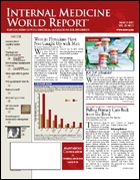Publication
Article
Internal Medicine World Report
Dopamine-Based Patch Potential Treatment for Elderly Patients
Author(s):
From the American Neurological Association
CHICAGO—A transdermal patch using the investigational dopamine receptor agonist rotigotine (Schwartz) provides sustained relief from the motor symptoms associated with Parkinson’s disease (PD) and may be used in elderly patients >75 years old.
Safety and efficacy data from pooled rotigotine trials were presented at the American Neurological Association annual meeting. “These data indicate that transdermal rotigotine may be a useful treatment option, not only for younger Parkinson’s disease patients but also for those over age 75, a patient subpopulation in which it has been common clinical practice to avoid dopamine agonist therapy,” said Ray L. Watts, MD, of the University of Alabama, Birmingham.
The trials included 938 patients with early PD (disease duration ≤3 years). The patients were randomized to a 2-, 4-, 6-, or 8-mg rotigotine patch applied once daily during a 4-week titration phase, followed by a 24-week maintenance phase.
During the maintenance phase, 8% of rotigotine patients reported nausea versus 4% of placebo patients. Application-site reactions occurred in 19% of active treatment patients and 6% of placebo patients, vomiting in 4% and 1%, respectively, and insomnia in 4% and 2%. The incidence of dizziness was similar in both groups.
Overall, 13% of rotigotine patients discontinued treatment due to adverse effects compared with 6% of those in the placebo group. Dr Watts noted that all adverse events were more frequent during the dose-titration phase and lessened in the 6-month maintenance phase. Both groups included patients >75 years old: 47 in the patch group and 32 in the placebo group.
Dopaminergic side effects (ie, nausea, vomiting, and hallucinations) occurred less often in the older than in the younger patients.
Transdermal rotigotine is under FDA review for the treatment of early PD. “The patch may help delay levodopa [Larodopa] use in early-stage Parkinson’s disease and has a low risk of dyskinesia,” said Dr Watts. He hypothesized that the dyskinesia associated with other dopamine receptor agonists may be reduced with the rotigotine patch thanks to the delivery of steady plasma drug levels.
Phase 3 efficacy data for rotigotine presented earlier showed a significant reduction in motor symptoms. One randomized, controlled trial included 273 patients with early PD (disease duration ≤5 years) and a Unified Parkinson’s Disease Rating Scale (UPDRS) motor function score ≥10, none of whom were being treated with levodopa. A 4-week titration period was followed by 24 weeks of maintenance.
UPDRS score decreased by a mean of 3.98 points in the 177 rotigotine-treated patients and increased by a mean of 1.31 points in the 96 placebo-treated patients (P <.001), reported Jack J. Chen, MD, of Loma Linda University, California. Results of a second trial involving 330 similar patients with early PD who were not taking levodopa showed a mean decrease of 6.83 UPDRS points for those taking rotigotine compared with a 2.33-point reduction with placebo (P <.001). The improvement in motor symptoms was similar to that seen with ropinirole.





